The efficacy of exogenous carbohydrate taken during the course of exercise in the heat is unclear. Studies have reported both increases (e.g. Millard-Stafford et al. 1992) and no improvement in performance with carbohydrate (e.g. Febbraio et al. 1996). The value of carbohydrate feeding during exercise in the heat appears to depend on three factors: the heat stress, the exercise intensity and the training status of the athlete. The purpose of the current study was to investigate the effect of exercise intensity on carbohydrate supplementation in the heat in a study approved by the local Ethics Committee.
Seven endurance-trained men (peak oxygen uptake (VO2) = 59 ± 1.8 (S.E.M.) ml (kg bw)-1) cycled to exhaustion on four occasions; twice at 55 % peak power output (PPO) and twice at 70 % PPO in an environmental chamber maintained at 35 °C and 30 % relative humidity. Subjects ingested either a 6.4 % maltodextrin solution (CHO) or an artificially flavoured and coloured placebo (PLA).
Time to fatigue was significantly greater in the 55 % PPO ride with CHO (Fig. 1). No difference was reported in the 70 % PPO trials, although there was a tendency for subjects to exercise for longer with CHO.
Plasma glucose tended to be higher in the CHO trial at 55 % PPO, but this was only significant at 10, 60 and 70 min. At fatigue in the 55 % PPO trials plasma glucose concentration was 5.63 ± 0.32 and 4.72 ± 0.24 mmol l-1 for the CHO and PLA conditions, respectively (P > 0.05).
Rectal temperature rose throughout the course of the trials at both intensities and was 39.1 ± 0.2 °C after the 55 % trial and 38.8 ± 0.4 °C after the 70 % trial. There were no differences between PLA and CHO conditions.
The results indicate that supplementation with CHO improves exercise performance in the heat at 55 % PPO, but with little or no effect at 70 % PPO. The mechanism remains to be determined for although blood glucose was higher with CHO, significant hypoglycaemia was not seen in any of the PLA trials. Exogenous carbohydrate may allow high rates of carbohydrate oxidation to be sustained but no evidence for this was seen in RER values which were just below 1 and very similar in all trials up to the point of fatigue.
We are grateful to Glaxo SmithKline Consumer Healthcare for provision of the drinks and preparation of the placebo.

